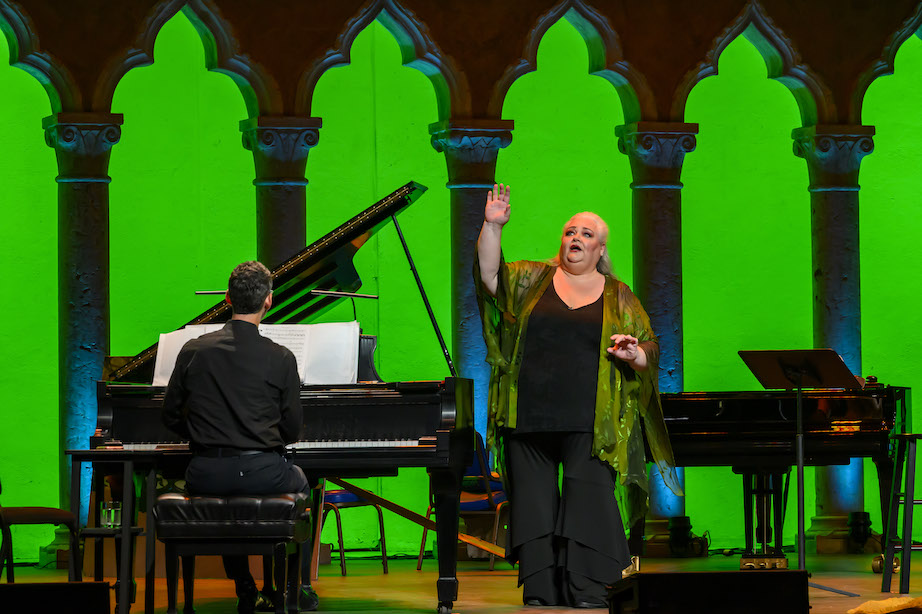On July 22nd, On Site Opera (OSO), New York’s pioneering opera company focused on immersive site-specific storytelling returned to the Caramoor Center for Music and the Arts in Katonah for a one-night-only performance entitled “A Night at the Opera with Stephanie Blythe and Laquita Mitchell.” The evening began with Rachel J. Peters’ opera Lesson Plan, a reimagining of the company’s winter digital production for the in-person stage, followed by scenes from Georges Bizet’s Carmen.

“Singing careers are a long, glorious fight / Each is a Queen of the Night.” These poignant phrases from Lesson Plan not only allude to the moniker of Mozart’s daunting, often voice-shattering role in The Magic Flute, but also play on the name of a cactus flower that lives only for a day, denoting a spirit of such fragility yet capable of the tireless perseverance just to have a fleeting instant in the sun. Or, in an opera singer’s case, a fleeting instant in the spotlight. The phrases are sung by one of the opera’s two protagonists, diva Alice Tommasso, a.k.a. Alice Thomas from Skokie, Illinois, in a moment of reflection on what it means to be an opera singer and maintain a successful career. After all, to quote Peters’ brilliant libretto again, “opera gives more as life offers less.” Devoting one’s life to singing thus takes on the aura of a sacred sacrifice, and divas—and divos—have, through the centuries been considered divine and worshipped by audiences. Egomaniacal personalities have often emerged from many of those living in the stratosphere of operatic fame and fan adoration. Yet, what about those who sing for the love of it, without the professional goal? Those who don’t need to change their names or roam the world because—another libretto quote—they “have already arrived.” Is their love of music and music making any less sacred? As the character of Robinetta tells Alice: “We are outstanding just like you.” And they are, as Lesson Plan demonstrates through Robinetta, also possessed of a wisdom and all-encompassing empathy that tames the haughtiest of spirits and changes their perspective.

Rachel J. Peters’ opera is based on Der Schulmeister, a comical cantata by Georg Philipp Telemann, adapted to our times with additional music and the English libretto by Peters; the plot, in short: an operatic star believes that she will give a masterclass at a prestigious conservatory, and through an administrative glitch, arrives to teach at a community college. Philosophical, hilarious, touching, and profoundly humane, Lesson Plan sparkles in musical playfulness and allusions, winking at us with quotes from Puccini’s Madama Butterfly and evoking Mozartian-like phrases and da capos, especially in the duets. It maintains On Site Opera’s unique signature of immersive performances by turning the audience into a chorus of what Alice the diva considers hapless students who need to learn scales three notes at a time. We, the public/students, received packages of these scales in a funny concoction of musical and diction exercises that somehow involved falconry excursion packages and a homemade horseradish recipe, comical foils to the diva’s grandeur.
Stephanie Blythe dazzled and entertained as Alice Tommasso, with her stunning, multifaceted voice, perfect diction, and comedic timing cleverly framed by the gestures and body language of a stereotypical operatic diva. Playing Blythe’s reality-check-inducing partner in the opera, the community college arts administrator Robinetta, Laquita Mitchell was an absolute delight as her crystalline, fresh, supple voice danced effervescent circles around Blythe’s imposing, majestic sound. OSO’s co-founding General and Artistic Director, Eric Einhorn’s stage direction cleverly showcased the comedic talents of both singers without interfering with their vocal production and maintaining the flow between their interactions and the subtlest blocking changes natural and smooth.

Part two of OSO’s program led us into tragedy with a minimally staged Carmen. Still, its message resonated deeply with Lesson Plan‘s reflection on what it means to have a singing career and the stereotypes and narrow-mindedness that have blocked access to that career for diverse singers that did not fit into pre-determined categories. In these Carmen scenes, it is a woman who sings the role of Don José. Which is not a novelty for Stephanie Blythe. She has taken on the role of Don José in Chicago last year, billed as her drag king alter ego Blythely Oratonio, “the tender, testosterone-filled tenor of the century” as Oratonio’s bio states. I think that guiding the audience from experiencing Lesson Plan’s stereotypical diva stuck in preconceptions and snobbery to the jaw-dropping, tenor voice that Blythe unleashed in the second half was a stroke of genius on the part of On Site Opera. In building the symbolic arc of this program, the gates of preconceptions were meant to burst open and any possible bias melt in the splendor and emotional power of the same singer’s voice. A gender-fluid voice that, through such pathos and genuine commitment to the music, took us to the heart of what singing really is about, free of limiting human-made constructs that can deprive us of potential great artistry and humanity.

Whether in elevation, refuge, catharsis, connection, or empathy, our visceral reaction to music sung by the human voice is forged in the emotional colors and sincerity of that voice, not through the artificial constructs around it. Blythe’s Don José resounded more vivid, moving, and passionate than many male tenors this reviewer has heard in the role. She didn’t even need to move or gesture; her voice alone transmitted it all. From suave tenderness in “The Flower Song” to the intimidating, anguishing, overpowering waves of sound in the final duet with Carmen, Blythe portrayed a nuanced, intense, and ardent Don José. Laquita Mitchell’s clear-toned, graceful, and sweet Micaëla conveyed the innocence of the character while transmitting both vulnerability and determination, especially in her aria “Je dis que rien ne m’épouvante.” As Carmen, Maya Lahyani brought fire and flamenco-like passion to her elegant stage presence. She regaled us with an ample, scintillating sound alternating between sensual legato in the Habanera, teasing sparkles in the Seguidille, and dark, menacingly fateful colors in the final duet, which made this reviewer wish she could have heard Lahyani sing the “Card Aria” as well.

Pianists Jonathan C. Kelly and Candace Chien offered generous and responsive musical support for the singers, in lieu of an orchestra. Their rendition of the Interlude was particularly beautiful in their lyrical, dynamic-sensitive playing. Eric Einhorn provided the narrative between scenes clearly and tantalizingly, with just enough information to keep even those of us who know the story of Carmen in suspense from one scene to the next.
A delightful, thought-provoking evening, full of discovery, meaning, and, of course, the pure, liberating, boundary-smashing power and love of singing.
All photos by Gabe Palacio
Featured photo: Stephanie Blythe as Alice Tommasso with pianist Jonathan C. Kelly in Lesson Plan by Rachel J. Peters.







